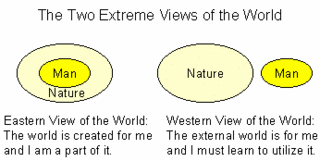 he world:
he world:In economic point of view, we cannot get developed just worshipping god and doing what has written in holy books. Most of the religion and cultures, people say that it was god’s wish so that it happened. If God wish for tsunami in which millions of people have lost and separated with their love ones. How a God can do if he creates? It is better to prevent than blame God. One of the economist has said that if you don’t have anything to do then go and dig your field whole day and fill it back at night. This statement trying to explain that we have to work for development, not just praying God to be developed. However in Gita as well, Krishna has told to Arjuna to engage yourself in proper activities. Action is better than non-action. Without work, even the bare substance of life is not possible.
If we assume that God has created us and this universe then who has created God? We also know that something cannot come from nothing. If there would be answer nothing then we are accepting that something can come nothing. Then it would true that we and the universe came from nothing. However some of the Atheism say that God gave Human free will, without it, we couldn’t love or do anything virtuous. Without free will we would be non-rational automatons. While God can and does intervene in the universe, if He intervened to stop all evil doing and natural disasters we would be effectively like helpless infants. And if God constantly intervened against nature’s laws, there would be no pattern by which man could discover how the world works. There would not be science, no pre-dictabilty of nature to rely on. The universe would be irrational. But if these laws originate in the mind of God, we are brought back to the question of God is own origins, which theists do not account for. Whereas neither side of the debate can solve the problem of first cause, what are we to believe?
The phenomena as human consciousness and sensation (including the sensation of free will) were used as evidence for the existence of a God because these things cannot be explained by scientists. But this amounts to taking anything that is beyond our present comprehension as evidence of a complex, creator of the universe. Such reasoning renders the human intellect powerless to investigate the unknown. Imagine if past declare that God causes such things as fire, thunder, rain, and biodiversity were left unchallenged in similar fashion. The world would be a simple place.
Continue.............................
If we assume that God has created us and this universe then who has created God? We also know that something cannot come from nothing. If there would be answer nothing then we are accepting that something can come nothing. Then it would true that we and the universe came from nothing. However some of the Atheism say that God gave Human free will, without it, we couldn’t love or do anything virtuous. Without free will we would be non-rational automatons. While God can and does intervene in the universe, if He intervened to stop all evil doing and natural disasters we would be effectively like helpless infants. And if God constantly intervened against nature’s laws, there would be no pattern by which man could discover how the world works. There would not be science, no pre-dictabilty of nature to rely on. The universe would be irrational. But if these laws originate in the mind of God, we are brought back to the question of God is own origins, which theists do not account for. Whereas neither side of the debate can solve the problem of first cause, what are we to believe?
The phenomena as human consciousness and sensation (including the sensation of free will) were used as evidence for the existence of a God because these things cannot be explained by scientists. But this amounts to taking anything that is beyond our present comprehension as evidence of a complex, creator of the universe. Such reasoning renders the human intellect powerless to investigate the unknown. Imagine if past declare that God causes such things as fire, thunder, rain, and biodiversity were left unchallenged in similar fashion. The world would be a simple place.
Continue.............................

No comments:
Post a Comment